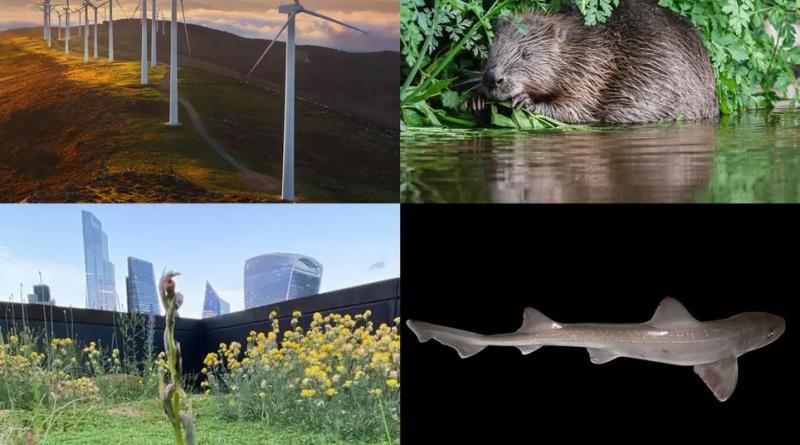Sharks in the Thames and renewable energy records: Ten positive environment stories from 2021

‘Lost’ species were rediscovered, rewilding projects flourished and progress was made in climate talks
From the accelerating extinction of species worldwide to wildfires in Siberia and record-breaking floods in China and Italy, the slew of environmental disasters over the last year have been impossible to ignore.
While Cop26 was able to go ahead in 2021 after being postponed due to the pandemic, the watered-down wording of the final agreement attracted criticism. The Glasgow pact only just kept the 1.5C goal alive – and that could unravel if countries don’t stick to their commitments and present more ambitious plans in future.
But even in 2021, some positive environment stories emerged as ‘lost’ species were rediscovered, rewilding projects flourished and renewable energy had another record year of growth.
Here, are some of The Independent’s top positive environment stories of the year:
Renewable energy had a record year
This year was renewable energy’s biggest yet despite the pandemic and the rising cost of raw materials, according to the International Energy Agency.
By the end of 2021, additions of new renewable power capacity are expected to rise to 290 gigawatts – mostly in the form of wind turbines and solar panels. This would surpass the previous record, set last year, of 280 gigawatts.
The IEA said that on this trajectory, in five years’ time renewable energy would account for the same total global power capacity of fossil fuels and nuclear combined. However, the agency warned that this level of growth is still only about half that required to meet net zero carbon emissions by mid-century.
Sharks found living in the River Thames
London’s River Thames is now home to sharks thanks to extraordinary conservation efforts that have restored the waterway after it was declared “biologically dead” in 1957.
Tope sharks found in the Thames can grow up to six feet long and live 50 years, while spurdogs release venom from their fins.
Seahorses, eels and seals can also be found living in the river, according to the State of the Thames Report by the Zoological Society of London published this year. The report is the first-ever complete health check of the river.
Despite the success of conservation efforts in the Thames, climate change and associated sea-level rises paint a “worrying picture” for the future of the river, according to the report.
On average the temperature of London’s waterway has increased by 0.2C a year and water levels have increased since 1911.
Cop26 kept goal of 1.5C of global heating alive, but only just
The agreements and deals made by the 196 nations at the Cop26 climate summit helped move the world a little closer to the path of limiting global temperature rise to 1.5C above pre-industrial levels.
Notably, countries at the summit agreed on more concerted efforts to phase out coal, end deforestation and slash methane emissions. In a surprise announcement, China and the US agreed to boost climate cooperation over the next decade.
However, the watered-down wording of the final agreement from the summit was criticised for not going far enough on reducing reliance on coal. Developing countries were also left disappointed after the final text failed to deliver on loss and damage finance to help them deal with the sharpest effects of the climate crisis.
While the goal of 1.5C might have been kept alive during Cop26, there is still a long way to go until we are on track to meet that target. According to Climate Action Tracker, the results of the summit mean the global temperature will rise by 2.4C by the end of the century if only the pledges for 2030 are implemented or by 1.8C if all countries’ announced targets are fully achieved.
Shelley’s Eagle owl not seen for 150 years pictured in wild for first time
A giant owl that had gone almost unseen in African rainforests for 150 years was photographed in the wild for the first time.
The Shelley’s eagle-owl was spotted in Atewa forest in Ghana by British researchers in October. It was the first confirmed sighting of the bird since the 1870s.
Dr Robert Williams, one of the researchers who spotted the owl, said he hoped the discovery of “such a rare and magnificent owl” will help boost efforts to save “one of the last wild forests in Ghana”.
China pledged to stop building coal plants abroad
Xi Jinping announced in September that China will stop building coal plants abroad, a move that could be pivotal in reducing global emissions.
China is the world’s largest public financier of overseas coal plants. It funds projects from Indonesia to South Africa as part of a massive infrastructure project known as the Belt and Road initiative.
President Xi’s announcement was welcomed by climate scientists, policy experts and activists. But they stressed that many questions remain.
For instance, President Xi’s remarks did not include a timeline for the coal drawdown, or mention whether it included private and public funding for overseas coal plants. It is also unclear if the announcement applies to plants that have been proposed or are in the planning stages.
Scientists learnt more about the amusing habits of octopuses
Researchers discovered that female octopuses will sometimes throw shells at males annoying them.
Footage of octopuses off the coast of Australia showed females throwing silt, shells and algae at males during unwanted mating attempts.
In one instance, a single female octopus threw material 10 times, with five of these hitting a male in an adjacent den, which the scientists said had been attempting several times to mate with her.
The researchers from Australia, the US and Canada concluded that octopuses can “definitely be added to the short list of animals who regularly throw or propel objects, and provisionally added to the shorter list of those who direct their throws on other animals”.
Beavers returned to British rivers after 400 years
Around 400 years after humans wiped out beavers across Britain, the species was brought back to several sites in record numbers in 2021.
Pairs of beavers were introduced in the South Downs, Dorset, Derbyshire, the Isle of Wight, Nottinghamshire and Montgomeryshire in mid-Wales.
The first baby beaver was born on Exmoor for 400 years after two adults were introduced to Holnicote Estate in Somerset in January 2020. The kit was named after England football star Marcus Rashford following a public poll.
Many more releases are on the horizon including plans to reintroduce the species to London’s Hyde Park.
As a keystone species, beavers play an important role in helping to modify the environment around them, support other animals and reduce the risk of floods.
Orchid thought to be extinct in UK found on roof of London bank
A rare species of orchid thought to be extinct in the UK was discovered growing on the rooftop of an 11-storey London bank in June.
Serapias parviflora, also known as small-flowered tongue orchid, has not been sighted in the UK since 1989, when a colony was found in Rame Head in Cornwall.
The new discovery of 15 of the plants on the rooftop garden of Nomura, a Japanese bank, now represents the entire known wild UK population of the species. The plants grow to about 30cm and typically have between three and 12 small orange flowers.
Shell was forced to slash global emissions after a landmark court ruling
A court in the Netherlands ordered oil giant Shell to cut its global emissions by 45% compared to 2019 levels in a landmark case in May.
It is the first time a company has been legally obliged to align its policies with the Paris climate accords, according to Friends of the Earth (FoE).
FoE brought the case to court in 2019, alongside six other activist groups and more than 17,000 Dutch citizens.
Although the decision only applies in the Netherlands, it could have wider effects elsewhere. It was hailed by FoE lawyer Roger Cox “as a turning point in history” in holding large polluting corporations to account over their emissions.
US officially rejoined the Paris agreement
Just 107 days after it had left at the behest of former president Donald Trump, the US officially returned to the Paris climate accord in February.
Joe Biden moved to reverse this on his first day in office as part of a sweep of executive orders to tackle the climate crisis.
It was a U-turn on Donald Trump’s decision to exit the deal during his presidency, after he dubbed the agreement a “disaster” for America.
The Paris Agreement, signed by nearly 200 counties, aims to limit global temperature rise to 1.5C above pre-industrial levels by the end of the century.





